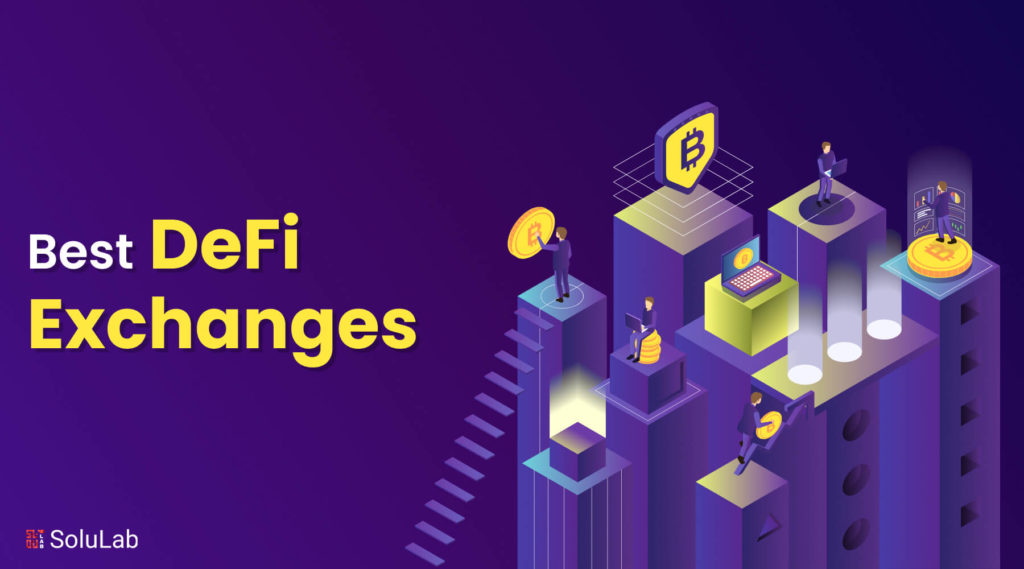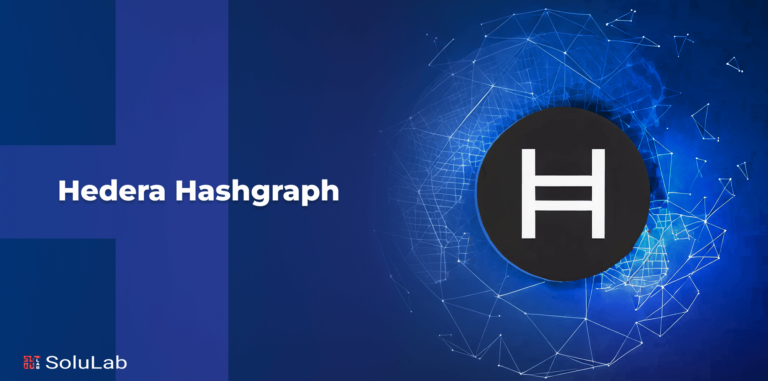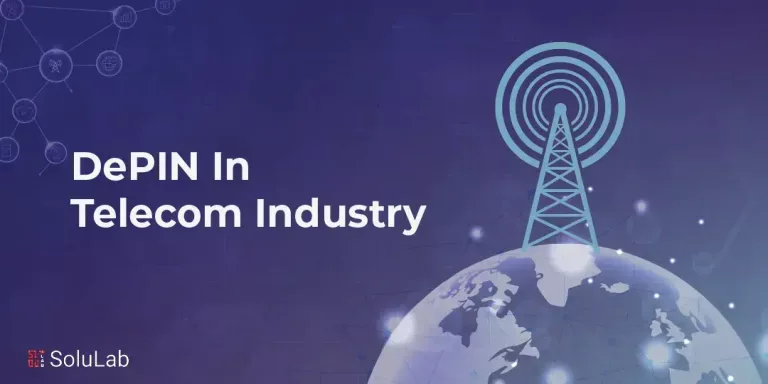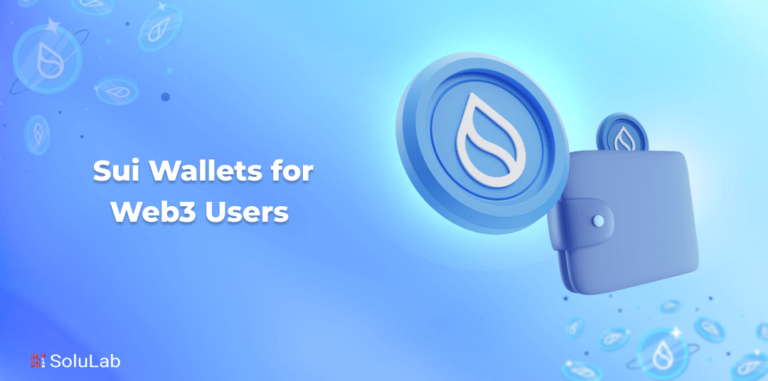
The decentralized finance (DeFi) ecosystem has emerged as a transformative force within the global financial landscape. Built on blockchain technology, DeFi exchanges have revolutionized how we interact with traditional financial instruments. In 2025, the DeFi space continues to expand, with an array of cutting-edge exchanges vying for supremacy.
This article delves into the top 10 DeFi exchanges of 2025, showcasing their unique features and contributions to the evolution of decentralized finance. But, before that let’s discuss what is DeFi Exchange in brief.
What is DeFi Exchange?
A DeFi exchange, short for Decentralized Finance exchange, is a type of cryptocurrency exchange that operates within the decentralized finance ecosystem. Unlike traditional centralized exchanges, where transactions are facilitated by a central entity and users rely on intermediaries to manage their funds, DeFi exchanges operate on blockchain technology and smart contracts to permit for direct user-to-user peer-to-peer trade.
Key Characteristics of DeFi Exchanges
Decentralized Finance (DeFi) exchanges are a type of cryptocurrency exchange that operate on blockchain technology and aim to provide users with more control, transparency, and autonomy over their financial transactions. Here are some key characteristics of DeFi exchanges:
- Decentralization: DeFi exchanges are decentralized in nature, meaning they don’t rely on a single central authority to manage transactions or hold user funds. Instead, they utilize smart contracts on blockchain networks like Ethereum to automate trading and asset management.
- Non-Custodial: In a DeFi exchange, users retain control of their private keys and funds. This eliminates the need to trust a third party with custody of assets, reducing counterparty risk associated with centralized exchanges.
- Peer-to-Peer Trading: DeFi exchanges enable users to trade directly with one another without intermediaries. This creates a more direct and transparent trading process.
- Automated Market Making: Many DeFi exchanges employ automated market maker (AMM) protocols. These protocols use liquidity pools, where users contribute their funds, enabling instant trades and price discovery without relying on traditional order books.
- Access to Diverse Assets: DeFi exchanges typically support a wide range of tokens and assets, beyond the major cryptocurrencies. This enables users to trade a variety of tokens and engage in unique investment strategies.
- Programmability: Smart contracts on DeFi exchanges can be programmed to execute various functions automatically, such as providing liquidity, distributing rewards, and executing complex trading strategies.
It’s important to note that while DeFi exchanges offer numerous advantages, they also come with certain risks, including smart contract vulnerabilities, liquidity risks, and regulatory uncertainties. As the DeFi space evolves, users should exercise caution, conduct thorough research, and stay informed about potential risks before participating in DeFi exchanges.
Importance of DeFi Exchanges in 2025
In 2025, the importance of DeFi exchanges has grown exponentially, as they continue to reshape and revolutionize the global financial landscape. These platforms have not only expanded access to financial services but have also introduced a new level of transparency, efficiency, and inclusivity. Here are some key reasons highlighting the significance of DeFi exchanges in 2025:
- Financial Inclusion: Leading DeFi exchanges have opened the doors to financial markets for individuals who were previously excluded due to geographical barriers, lack of access to traditional banking, or restrictive regulations. Anyone with an internet connection can participate in DeFi, enabling the unbanked and underbanked populations to engage in financial activities.
- Peer-to-Peer Transactions: DeFi exchanges facilitate peer-to-peer transactions without intermediaries, reducing the need for middlemen like banks and brokers. This direct interaction between users promotes transparency, lower fees, and faster transactions.
- Ownership and Control: Users retain full ownership and control of their assets on top DeFi exchanges. Private keys are held by individuals, reducing the risk of centralized exchange hacks and mismanagement of funds.
- Programmable Financial Instruments: DeFi exchanges allow users to create, customize, and automate financial products and services using smart contracts. This includes lending, borrowing, yield farming, staking, and more. This programmability gives users the freedom to design their own financial strategies.
- Decentralized Governance: Many DeFi platforms implement decentralized governance models, where token holders participate in decision-making processes. This empowers the community to shape the future direction of the platform and ensures that the interests of users are considered.
- Liquidity Provision: DeFi exchanges rely on liquidity pools created by users, enabling instant and continuous trading. This system provides more efficient price discovery and minimizes market manipulation.
- Cross-Border Transactions: DeFi exchanges enable seamless cross-border transactions, reducing the need for intermediaries and high foreign exchange fees. This is especially beneficial for remittances and international trade.
- Yield Generation: DeFi exchanges offer opportunities for users to earn passive income through yield farming, staking, and liquidity provision. Users can put their assets to work and earn rewards in the form of interest or additional tokens.
In 2025, the importance of leading DeFi exchanges cannot be overstated. They have transformed the way individuals interact with financial systems, offering a decentralized alternative that is more inclusive, efficient, and innovative. As the DeFi ecosystem continues to evolve, these exchanges will likely play an even more significant role in shaping the future of decentralized finance. However, users should remain vigilant and informed about the risks associated with DeFi, as the space is not without its challenges and uncertainties.
Things to Keep in Mind while Selecting a DeFi Exchange
By staying informed and adopting best security practices, you can enjoy the benefits of cryptocurrencies while ensuring the safety of your investments in this dynamic and exciting financial landscape. Some key factors to keep in mind include:
- Security and Audits: Security is the cornerstone of any leading DeFi exchange. Look for platforms that prioritize security by conducting thorough smart contract audits performed by reputable third-party firms. These audits help identify vulnerabilities and ensure the platform’s integrity. Prioritize exchanges that have a history of proactive security measures and prompt response to potential threats.
- User Interface and Experience: An intuitive and user-friendly interface is crucial for a smooth trading experience. A well-designed platform enhances your ability to navigate through the exchange, execute trades, and manage your portfolio effectively. Prioritize platforms that prioritize user experience and provide clear, concise, and user-friendly interfaces.
- Supported Tokens and Pairs: The availability of a wide range of supported tokens and trading pairs is essential. A diverse selection allows you to engage in various trading strategies and seize emerging opportunities within the DeFi space. Ensure that the exchange supports the specific assets you’re interested in trading.
- Liquidity and Trading Volume: High liquidity and trading volume are indicative of a healthy trading environment. These factors lead to tighter spreads, faster order execution, and a more seamless trading experience. Opt for exchanges with strong liquidity and active trading activity to minimize slippage and maximize your trading potential.
- Fees and Costs: Understanding the fee structure is critical to managing your trading costs. Be aware of trading fees, withdrawal fees, and gas fees (transaction fees on blockchain networks). Compare fees across different exchanges to ensure that you’re getting competitive rates that align with your trading frequency and volume.
- User-Friendly Interface: The wallet’s user interface should be intuitive and easy to navigate, especially for beginners. Complicated interfaces might lead to mistakes that could compromise the security of your funds.
- Reputation and Reviews: Research the exchange’s reputation within the DeFi community. Seek out user reviews, testimonials, and feedback to gain insights into the experiences of other traders. Positive feedback indicates reliability, while negative feedback can highlight potential issues or challenges.
- Customer Support: Quality customer support is vital for resolving issues and addressing inquiries promptly. Prioritize exchanges with responsive customer support channels that can provide assistance in a timely manner. This ensures that you have a reliable source of help whenever you encounter challenges.
- Privacy and KYC: Decide whether you value privacy or are comfortable with Know Your Customer (KYC) verification. Some DeFi exchanges require identity verification, while others respect user privacy. Choose from the best DEFI exchanges that aligns with your preferences regarding the level of personal information you’re comfortable sharing.
- Regulation and Legal Compliance: Research the exchange’s reputation within the DeFi trends. Understand the regulatory environment in which the exchange operates. Ensure that the platform complies with relevant laws and regulations, reducing potential legal risks for both the exchange and its users.
Here are the Top 10 DeFi Exchanges in 2025.

1. Uniswap
Uniswap's influence in the DeFi sector remains undeniable. As a decentralized exchange based on Ethereum, it introduced the automated market maker (AMM) model, where users can trade directly from their wallets without intermediaries. Its impact reverberates through the entire DeFi space, setting a benchmark for user-friendly interfaces, extensive token offerings, and liquidity incentives. Furthermore, if your intention is to earn rewards through liquidity provision, Uniswap offers a straightforward method to achieve this. Uniswap ensures that all liquidity providers receive a proportionate share of the 0.3% trade fee, based on the amount of capital they have contributed to the liquidity pool. Uniswap's open-source nature has not only paved the way for innovation but has also catalyzed the growth of a multitude of other decentralized exchanges and DeFi projects. Its permissionless design allows developers to create and launch their own versions of Uniswap, contributing to the decentralized exchange landscape's diversity and expansion. This ecosystem effect underscores Uniswap's lasting impact as a trailblazer in reshaping the financial industry by providing users with unprecedented control, accessibility, and opportunities within the rapidly evolving DeFi ecosystem.

2. SushiSwap
SushiSwap, a Uniswap fork, has evolved into a powerhouse with features like yield farming and staking. Its native token, SUSHI, has transformed into a governance and rewards mechanism, propelling it into the upper echelons of the DeFi exchange hierarchy. SushiSwap stands out from other Ethereum-based decentralized exchanges due to its enhanced potential for liquidity providers to generate earnings. However, it's important to note that SushiSwap is currently in the process of winding down several initiatives. SushiSwap's success lies in its ability to build upon the Uniswap model by introducing innovative features like yield farming and staking. These mechanisms not only incentivize liquidity providers with attractive rewards but also engage the community in the platform's governance decisions, fostering a sense of ownership and participation. The SUSHI token's evolution from a mere trading asset to a multifaceted utility token reflects the platform's commitment to aligning the interests of its users with its growth trajectory. While SushiSwap's accomplishments are undeniable, its ongoing transition highlights the dynamic and rapidly changing nature of the DeFi landscape, reminding participants of the importance of staying informed about the latest developments and changes within the ecosystem.

3. PancakeSwap
Operating on the Binance Smart Chain, PancakeSwap has brought DeFi to a broader audience with its lower fees and faster transactions. Its familiar interface and diverse trading pairs make it a favorite among traders seeking a seamless experience outside the Ethereum network. PancakeSwap introduces its unique token called CAKE. Unlike being solely a governance token, CAKE serves as a liquidity provision token, effectively motivating liquidity providers to engage with the PancakeSwap platform. To begin using PancakeSwap, all you require is to link your non-custodial wallet containing the tokens you wish to trade. Once connected, you're ready to initiate your trading activities. PancakeSwap's strategic decision to operate on the Binance Smart Chain not only addresses the scalability and cost concerns often associated with Ethereum but also taps into the broader Binance ecosystem, offering users a seamless bridge between centralized and decentralized financial services. With its user-friendly approach and attractive rewards through CAKE token incentives, PancakeSwap has effectively democratized DeFi, making it accessible and appealing to a wide range of users looking to participate in decentralized trading and liquidity provision.

4. Curve Finance
Curve Finance specializes in stablecoin trading, offering low-slippage swaps for users seeking minimal risk exposure. Its protocol is tailored to maximize efficiency when swapping stable assets, making it a haven for yield farmers and liquidity providers alike. Curve boasts its proprietary token named CRV, accessible for purchase or acquisition through the provision of liquidity to designated liquidity pools. Furthermore, you have the option to stake your CRV tokens across multiple well-known yield farming platforms such as Convex Finance, thereby augmenting your potential rewards. Curve Finance's unique focus on stablecoin trading not only provides a haven for risk-averse traders but also contributes to the stability of the broader DeFi ecosystem by facilitating seamless and efficient stablecoin swaps. The integration of CRV tokens within various yield farming platforms enhances the utility and value of the token, offering users multiple avenues to participate in and benefit from the growing DeFi landscape.

5. Aave
Aave's Deversifi incorporates layer-2 scaling solutions to enhance transaction speed and reduce congestion. It excels in high-frequency trading and algorithmic strategies, attracting traders looking for advanced features and a competitive edge. The AAVE DeFi token, denoted by the ticker symbol AAVE, is an integral element within the Aave ecosystem. This token plays a vital role in governing the protocol and facilitating various functionalities within the decentralized finance (DeFi) space. It enables users to participate in governance decisions, earn rewards, and engage in lending and borrowing activities on the Aave platform. Aave's Deversifi not only leverages layer-2 scaling to optimize trading performance but also exemplifies the synergy between DeFi and scalability solutions, marking a significant step toward a more efficient and accessible financial ecosystem. As AAVE token holders actively contribute to the platform's development and decision-making, they play a pivotal role in shaping the future of DeFi while simultaneously reaping the benefits of its diverse functionalities and opportunities.

6. Compound Finance
Compound Finance, a pioneering project in the decentralized finance (DeFi) ecosystem, has expanded its influence beyond its core lending and borrowing functionalities by introducing a decentralized exchange platform. This platform enables users to seamlessly trade a diverse array of Ethereum-based assets within the Compound ecosystem, capitalizing on its established liquidity pools and integrated features. The addition of a decentralized exchange (DEX) to the Compound Finance suite of offerings signifies a strategic move toward creating a comprehensive DeFi ecosystem that caters to a broader spectrum of financial activities. By integrating trading capabilities, Compound enhances its appeal as a one-stop solution for users looking to engage in various decentralized financial activities without needing to navigate multiple platforms.

7. Balancer
Balancer's innovative platform not only enables users to create personalized liquidity pools but also introduces a novel concept of "smart" pools. These smart pools automatically rebalance their asset allocations to maintain the desired weightings, optimizing returns and minimizing the need for constant manual adjustments. This dynamic feature provides a hands-off approach for liquidity providers while ensuring efficient trading opportunities for users. Moreover, Balancer's native token, BAL, adds an additional layer of engagement and incentives. Beyond traditional trading and investment, liquidity providers are rewarded with BAL tokens for contributing to the ecosystem. This incentivization mechanism fosters active participation and aligns the interests of various stakeholders, ultimately contributing to the platform's overall growth and sustainability. Balancer's user-centric approach and unique token dynamics position it as a dynamic force within the evolving DeFi landscape.

8. Kyber Network
Kyber Network's success is further amplified by its commitment to interoperability. Through integrations with various DeFi platforms and wallets, users can easily access its services and perform token swaps directly within their preferred interfaces. This convenience enhances the network's accessibility and contributes to its reputation as a user-friendly and versatile decentralized exchange. Additionally, Kyber Network's decentralized nature ensures that users retain full control over their funds, reducing counterparty risks often associated with centralized exchanges. This security, combined with its efficient and transparent trading mechanisms, positions Kyber Network as a reliable and trusted solution for both novice and experienced traders within the DeFi ecosystem. As it continues to innovate and expand its offerings, Kyber Network remains at the forefront of revolutionizing the way individuals access and trade digital assets.

9. Bancor
Bancor's dynamic pricing mechanism is a groundbreaking advancement in the decentralized finance (DeFi) landscape, addressing one of the key challenges faced by liquidity providers - impermanent loss. This innovative solution mitigates the impact of volatile price movements by automatically adjusting token prices in response to changes in supply and demand. As a result, liquidity providers on the Bancor decentralized exchange can experience reduced impermanent loss, making the platform an enticing option for those seeking stable and sustainable yield generation. This unique approach not only fosters a more secure and predictable environment for liquidity provision but also underscores Bancor's commitment to pioneering user-centric solutions that drive the evolution of DeFi.

10. Synthetix
Synthetix's revolutionary platform operates on the foundation of blockchain and smart contracts, allowing users to create, trade, and hold synthetic assets that represent real-world commodities, cryptocurrencies, and traditional financial instruments. This innovative approach democratizes access to a wide range of assets, from stocks and indices to commodities like gold and silver, even in regions with limited financial infrastructure. The decentralized exchange within the Synthetix ecosystem ensures that users can instantly trade these synthetic assets 24/7, without the need for intermediaries or traditional financial institutions. This not only increases market efficiency but also enables users to respond quickly to market developments and seize investment opportunities.
Final Words
The DeFi landscape of 2025 is a testament to innovation, pushing the boundaries of traditional finance and decentralization. The top 10 DeFi exchanges highlighted in this article showcase the industry’s progress, offering traders, investors, and liquidity providers a spectrum of options that cater to diverse preferences and strategies. As the DeFi ecosystem continues to evolve, these exchanges pave the way for a more inclusive, efficient, and accessible financial future. However, users should remain vigilant, conducting thorough research and due diligence, as the DeFi space remains susceptible to risks and regulatory changes.
Yet, harnessing the capabilities of a leading DeFi exchange demands the guidance of a technical specialist who can collaborate alongside you. SoluLab emerges as a prominent DeFi development company, skillfully catering to a wide spectrum of business requirements with unparalleled precision to ensure absolute client contentment. Their remarkably proficient team excels in seamlessly tackling even the most intricate challenges.
Unleash the complete potential of DeFi exchange development solutions through SoluLab – Your reliable ally for the best tech solutions. Encounter seamless innovation and unparalleled proficiency. Connect with us today to bring your DeFi aspirations to life!

FAQs
1. What are DeFi exchanges?
DeFi exchanges, short for Decentralized Finance exchanges, are platforms that facilitate the trading of cryptocurrencies and tokens without relying on traditional intermediaries like banks. They operate on blockchain technology, offering users more control over their funds and fostering a decentralized financial ecosystem.
2. How were the top 10 DeFi exchanges of 2025 selected?
The top 10 DeFi exchanges of 2025 were selected through a rigorous evaluation process that considered factors such as trading volume, user experience, security features, token variety, and community engagement. Independent reviews, expert opinions, and real-world user feedback were also taken into account to ensure a comprehensive and unbiased ranking.
3. What benefits do the top DeFi exchanges offer to users?
The top DeFi exchanges of 2025 offer several benefits to users. These include lower fees compared to traditional exchanges, greater privacy due to reduced need for personal information, access to a wide range of tokens and cryptocurrencies, enhanced security through blockchain technology, and the ability to participate in yield farming, lending, and other DeFi protocols.
4. Can I trust the security of these DeFi exchanges?
Yes, the “Top 10 DeFi Exchanges of 2025” have been rigorously vetted for their security measures. These exchanges implement cutting-edge encryption, multi-factor authentication, cold storage solutions, and regular security audits to ensure the safety of users’ funds and data.




